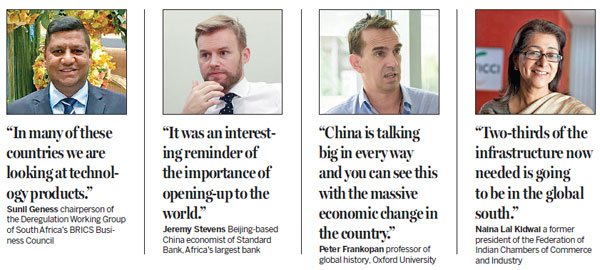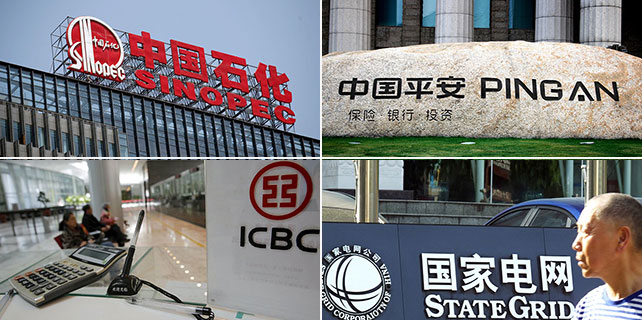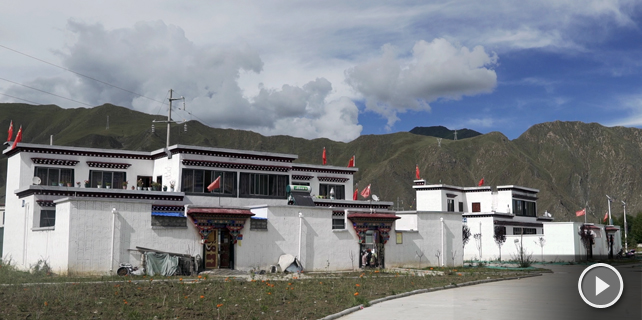Second wind

At Xiamen summit, BRICS nations commit to building on the achievements of the past decade and call for a commitment to globalization
BRICS — the grouping of leading emerging nations — should "set sail from Xiamen" into its second "golden decade", President Xi Jinping has said.
The president delivered the message in his address to the plenary session of the ninth BRICS Summit in Xiamen off China's southeastern coast, which concluded on Sept 5.
As chairman of the summit, Xi made clear China's commitment to the organization, which was originally formed in 2006 and whose membership now comprises Brazil, Russia, India and South Africa as well as China.
"BRICS cooperation is set to achieve greater development and play an even bigger role in international affairs," he said. "Let us set sail from Xiamen and join hands to usher in the second 'golden decade' of BRICS cooperation and deliver greater benefits to the people and our five countries and around the world."
The meeting, which was held under the theme "BRICS: Stronger Partnership for a Brighter Future", was attended by Russian President Vladimir Putin, South African President Jacob Zuma, Brazilian President Michel Temer and Indian Prime Minister Narendra Modi.
It was also attended by the leaders of the BRICS Plus nations of Egypt, Mexico, Thailand, Guinea and Tajikistan as part of efforts to extend cooperation to other emerging and developing nations.
The BRICS Business Forum held on Sept 3 was attended by 1,200 business leaders from 630 companies in China and around the world.
Observers at the summit in the Fujian province city and beyond were looking for indications as to where BRICS was headed to next.
Its main achievements so far have been the creation of the New Development Bank, the so-called BRICS bank, based in Shanghai, which issued its first loans last year; and the Contingent Reserve Arrangement, a stabilizing mechanism designed to protect the currencies of the members.
The declaration issued at the close of the summit reaffirmed BRICS nations' commitment to globalization, calling for vigilance "in guarding against inward-looking policies".
It also called for the global economic governance architecture to give an increasing voice and representation to emerging market and developing economies.
Greater trade and economic cooperation between the BRICS members themselves was also prioritized. Only 5.7 percent of the outbound investment of the BRICS members in 2016 was within the five countries themselves.
The declaration also highlighted security concerns, and its members promised to work together to deal with global security challenges.
It also reaffirmed the commitment of its members to fully implement the United Nations' 2030 Agenda for Sustainable Development.
There was also recognition of the importance of Africa with support for the African Union's Agenda 2063 to foster greater development on the continent.

China also made its own specific financial commitments to BRICS. President Xi announced that China will commit 500 million yuan ($77 million) toward a plan to create greater economic and trade cooperation between the members. He also announced $4 million of extra funding to the New Development Bank to support its long-term development.
On the final day of the summit, Xi also pledged $500 million in aid for developing nations to address issues such as famine, refugee crises, climate change and public health.
In his speech to the BRICS Business Forum on Sept 3, Xi said the BRICS nations had played a major role in steadying the world's economy after the global financial crisis of 2008. He pointed out that over the past 10 years, the GDP of the BRICS nations had increased by 179 percent and their trade by 94 percent, with their urban populations growing by 28 percent.
"In the past decade, we BRICS countries have surged ahead and become a bright spot in the global economy. The past decade has seen the BRICS countries making headway in pursuing common development," he said.
"The sudden outbreak of the 2008 global financial crisis left the world reeling, which is yet to fully recover. Facing the external shock, our five countries have held the ground by strengthening their domestic economies, boosting growth and improving people's livelihoods," he said.
The president also said the BRICS nations and other emerging and developing nations had an increasing role to play in a world no longer dominated by developed nations.
"Our world today is becoming increasingly multipolar, the economy has become globalized; there is growing cultural diversity; and society has become digitalized. The law of the jungle where the strong prey on the weak and the zero-sum game are rejected, and peace, development and win-win cooperation have become the shared aspirations of all peoples."
Xi also made reference to his early political career in Fujian province in the 1980s and Xiamen's role in China's opening-up to the rest of the world, with it being one of the country's first special economic zones, which kickstarted China's economic transformation.
"Xiamen's success is a good example demonstrating the perseverance of the 1.3 billion-plus Chinese people. In close to 40 years of reform and opening-up under the leadership of the Communist Party of China, we Chinese have forged ahead, fearless and determined."
Jeremy Stevens, Beijing-based China economist of Standard Bank, Africa's largest bank, said that by placing emphasis in his speech on next year's 40th anniversary of reform and opening-up, in which Xiamen played a significant part, Xi was sending an important message about the importance of globalization.
"It was an interesting reminder of the importance of opening-up to the world. As with his Davos speech in January, he was making clear his and China's commitment to globalization in marked contrast to the lurch to protectionism in the West," he says.
Wang Huiyao, president of the Center for China and Globalization, one of China's leading independent think tanks, agrees that this was another Davos moment, with Xi reaffirming China's, and also the BRICS nations', commitment to open trade.
"The BRICS nations have firmly rejected the protectionist position being taken by the US and fully support open trade. This is a very important message," he says.
Peter Frankopan, professor of global history at Oxford University, says Xi clearly sees engagement and openness as important.
"It is a very consistent message, which he also has demonstrated with the Belt and Road Initiative, to want to achieve greater cooperation, more trade, stability, greater prosperity and win-win outcomes," he says.
The historian, who is also the author of the international best-selling book The Silk Roads: A New History of the World, says it is in marked contrast to the message of protectionism currently being delivered by US President Donald Trump.
"You can become isolationist if you close all the windows and all the doors. China is, however, talking big in every way and you can see this with the massive economic change in the country," he says.
Kerry Brown, professor of Chinese studies and director of the Lau Institute at King's College London, says the summit declaration was right to highlight reform of the global financial architecture away from just the Washington-based Bretton Woods system that has prevailed since the end of World War II. Xi called for a more "just and equitable" international order in his address.
"It (BRICS) is part of a diversification of the international financial infrastructure and has given people the opportunity to think about how other partners beyond the traditional ones can play a role. So from that point of view, it is a very useful idea.
Rana Mitter, director of Oxford University's Dickson Poon China Centre, says, however, that it will be difficult for BRICS to challenge the global financial order, at least in the short term.
"At the moment, one of the obstacles is the pool of capital they have. It doesn't really match what you get now in the major financial centers. Within the grouping you can count Hong Kong (as a global financial center) obviously, but really the game is still happening in New York and London."
The focus in the summit declaration on fostering greater trade and investment within the BRICS bloc was widely welcomed by many attending the forum.
Sunil Geness, chairperson of the Deregulation Working Group of South Africa's BRICS Business Council, says greater economic integration should now be a priority for the organization. "Traditionally, if you look at these countries they have been trading with partners that are developed, the West and, in particular, Europe. This is where the original opportunities have stemmed from," he says.
"The challenge is for the companies within BRICS themselves to come up to a level where the products they produce match the standards that are available in the rest of the world. In many of these countries we are looking at technology products, which relate specifically to agriculture."
One area where there could be greater trade is in e-commerce, with the BRICS nations looking to set up a common e-commerce platform.
The initiative was outlined at the 7th meeting of the BRICS trade ministers in Shanghai in August, and the BRICS E-Port Network will initially operate on a voluntary basis.
"This really has huge potential and is an opportunity to create significant cross border e-commerce trade within the nations. It also demonstrates how important BRICS can be in practice," says Wang, who is also a counselor to the State Council.
"If such an e-commerce platform is successful, it could then be adopted by all the 160 or so World Trade Organization members, something that would be difficult if it hadn't been trialed by the BRICS nations first."
Naina Lal Kidwai, a former president of the Federation of Indian Chambers of Commerce and Industry and one of five BRICS business council members who attended the summit from India, says the emphasis on green development at the summit was the right way forward for the BRICS nations, particularly linking its agenda to the United Nations' 2030 Sustainable Development Goals.
She says one of the priorities has to be building sustainable infrastructure that does not repeat the mistakes of developed countries and avoids destroying the environment.
"Two-thirds of the infrastructure now needed is going to be in the global south, not just in the BRICS countries but other emerging markets as well. India alone needs $1 trillion of investment in the next five years," she says.
"There is an opportunity to build the right spaces for ourselves and not replicate what the rest of the world did and not see all the congestion and the pollution we have seen in the past."
Kidwai, previously group general manager of HSBC in India, is focused on developing green financing models that will lead to higher environmental standards.
"The rules and regulations for this are still very much a work in progress within the BRICS countries, but we seem to be pushing on an open door," she says.
"We must move toward a system where the actual certification of a project being green is not merely constrained to something that is obviously renewable but needs to include projects that are energy efficient and benefit the environment in other ways."
Some had suggested that with the launch of the Asian Infrastructure Investment Bank at the beginning of last year, China was no longer as committed to the Shanghai-based New Development Bank, which also has a similar infrastructure focus and is seen as one of BRICS' major achievements.
Xi's announcement of an injection of new funds into the bank during the summit reaffirms China's support for the fledgling financial institution.
Larissa Wachholz, director of Vallya, a business and investment consulting firm based in Brasilia, Brazil, says it is good news for the bank, which issued its first loan at the end of last year.
"What will define the role of the BRICS in the upcoming decade will be its ability to get the New Development Bank to work and accomplish the mission for which it was established, which is to implement the expensive infrastructure projects which will guarantee mid- to long-term economic growth. That is key for us," she says.
Whereas many emerging market economies have had turbocharged growth over the past three decades, there was emphasis on the quality of future growth at the summit.
Many of the BRICS economies can no longer rely on old manufacturing-exporting models and now must restructure if they are to survive.
President Xi said in his speech to the business forum that although this model had taken BRICS economies to the current level, they now need to embrace new technology.
Contact the writers at andrewmoody@chinadaily.com.cn









